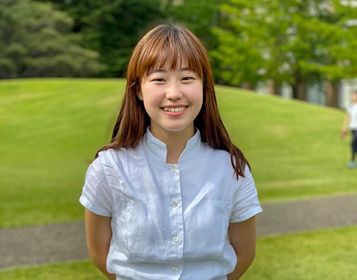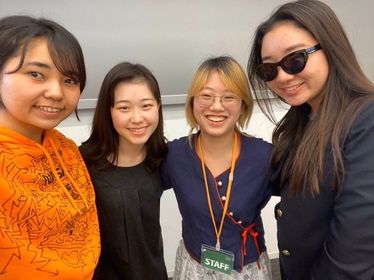Part 2: ICU PRISM’s Sari Kamiyama: “bridging the gap” to make small changes.

October 11th is International Girls Day and National Coming Out Day!
Interview Vol.11 Part 2, continuing from Part 1, will talk about gender activist Sari Kamiyama and her work in ICU PRISM. In Part 1, we introduced what she is doing in ICU PRISM, what led her to start her activism, and what she thinks about her role in “bridging the gap”.
In Part 2 she talks about what led her to take interest in activism, what “student organization” means to her, when she feels motivated, and lastly what she wants in society.
Read the full article to find out!
Q8. You mentioned you have been interested in activism since high school. What inspired you to start your activism?
I think it was when I found articles about feminism in celebrity magazines when I was in high school. At that time, I often stayed up late and spent my time watching foreign films rather than studying, and I started taking interest in the culture of English speaking countries. In the magazines, famous actresses spoke up for their rights, and their glamour left an impression on me. They were attractive because in my all-girls high school, being “graceful” was valued, and speaking up was not considered to be good. So I wanted to be like them. At the same time, the Tokyo Medical University’s entrance exam scandal (the university manipulated the score of female applicants) made headlines, and I began to think positively about speaking up against issues and doing activism.
Q9.Comparing before and after studying gender studies, do you see any changes in your views?
If I look back now, I realize the feminism featured in celebrity magazines didn’t take intersectionality into consideration. The women whose voices were featured in the magazines were white, cisgender, heterosexual women who were privileged and accepted in society already. I became interested in gender studies because of those women back then, but now my interest has gradually shifted to the male gaze and the evaluation of women in a patriarchal society. This interest motivated me to start my current project where I conduct interviews with contestants of beauty pageants. I want to know the reasons behind why those who acknowledge their privileges decide to participate in the pageants.
Q10. When do you feel motivated?
First, I feel motivated when I receive positive feedback from my friends or event participants. The words that motivated me the most were “ICU PRISM’s activities encourage and inspire people to think about gender” and “I took an interest in gender thanks to your instagram posts and stories.” If our actions empower someone and motivate them to take small actions–for example, researching gender-related words on the Internet-I think that signifies the importance of our existence and activism.
Second, the moment I feel motivated is when I realize our community has expanded and become multi-layered. This spring, ICU PRISM became a group consisting of 20 members. When we had only 5 members, we mostly worked on the same project together and distributed our work equally among us. But now, ICU PRISM has become a community where each member can do whatever they want and decide how they engage in the group. It’s okay if they only join the project that they are interested in, only listen to gender-related information the other members share, or choose not to get involved in any activities. I think those who study or are interested in gender-related topics, more or less feel uncomfortable in society, and I want ICU PRISM to be a safe space for them. ICU PRISM is definitely my safe space. It’s an inclusive environment where members have understandings of diversity, accept one another, discuss if we find something unclear, and learn together.
Q.11 What does “student organization” mean to you?
Even if you have thoughts, like “I want to do this” or “I want this to change,” it’s usually not easy to keep it up alone because you may face mental challenges or may get stuck. However, if you work with someone who shares the same purpose with you, you feel more motivated and have more opportunities to work on your ideas.
However, what I think about student organizations now is that it doesn’t need to specialize in particular activities. It’s okay that a student organization functions as either an activist group or a space safe. The current ICU PRISM does not tie the members to a particular goal, but those who want to make a change and those who are interested in gender form the community. I used to believe it was important to work together sharing the same goal, but now I just want ICU PRISM to function as a safe space for our members. It’s important to work in a laid-back way.

Q12. What have you learned from your activism? What would you like to say to ICU students?
First, what I have learned is I don’t want to tolerate superficially attractive feminism. These days, we often see superficial feminist and gender-friendly expressions around us. Of course, “attractive” feminism was one of the strategies for feminism to thrive when feminism was not accepted in society, so I’m not criticising such feminism itself. However, if we just aim to grab public attention solely by using nice-sounding words and good-looking visual designs, we would not be able to reform the social structures that we all should be critical of, such as capitalism, male-centricism in the media, and heteronormativity, and maybe even contribute to such social structures. One example is the mascara advertisement that uses the catchphrase, “it’s okay to be strong” (#Tsuyokute-iinda), which seems to have a feminist narrative that affirms a new, strong woman figure. However, it is a man that promotes this woman figure in the latter half of the advertisement. I assume that the discourse of men evaluating women underlies the advertisement. This is an accurate embodiment of “attractive” feminism because it includes a gender-friendly narrative, but ultimately perpetuates the existing social structure.
Second, we can’t create huge changes at once. Even if a rule is changed, it’s not easy to change people’s values. However, this doesn’t mean that something big needs to happen to create change; ICU PRISM’s presence and activities on social media can spread small, invisible changes. Our presence is the root of change. We can’t separate ourselves from gender as long as we all have a sex/gender. Examining what “normal” is and correcting such discourse is the basis of gender studies, and if we look at our society through the lens of gender studies, we cannot help realizing that our common sense is actually a social construction. Even if the current discourse of “normal” is dismantled, a new “normal” will be produced, and the violent nature of the discourse of “normal” towards minorities will persist. However, it’s significant to let those who are on the oppressive side know there are diverse values and to visualize the oppressive social structure. It’s also important to eventually dismantle this social structure. If such paradigm shifts accumulate, the violence within the discourse of “normal” will be reduced, even a little.
Q13. What would you like to say to society?
I would like to inform society that no matter how many rules are changed, as long as the power or the mindset of those who control them stay the same, the new rules will be superficial and empty. This is not only about gender-related issues, but it takes a very long time after the rules are changed and spread before they fully alter people’s values. For example, it took around 100 years to completely change the starting style in the 100 metre sprint from the standing style to the crouching style. It should take around the same amount of time or much longer to eradicate gender disadvantages in Japan. I think gender studies sees the big picture of social structures and visualizes the root cause of gender disadvantages and discrimination of all scales that are happening now. It’s important to include the viewpoint of gender studies in various other discussions.
In our current society, those who study gender are seen as “outsiders,” but I want everyone to study gender together so we won’t hurt others or hurt ourselves. Personally, I was forced to behave like a woman, and I blamed myself for any disadvantages I faced because of both my non-feminine and feminine behaviors. But while I was reexamining these experiences, I realized that I shouldn’t have blamed myself. I realized that these disadvantages are not individual issues but social issues that are derived from an unequal social structure. I would like to tell people that it’s important to remove internalized frameworks of thought and redefine our experiences.
Q14. Could you tell us what you want to try next?
This is something I personally want to try, but I want to create an online gender studies course. Studying gender studies, I’ve enjoyed visualizing gender-related issues and social structures. Since I’m good at making illustrations, I want to use my illustrations in a video production and suggest a film that articulates gender-related issues so that people will be able to grasp the concept of gender studies easily. I’m planning to start it on Twitter and/or Youtube by the end of the year, targeting young people, such as students and those who are already working. In addition to that, I also want to use art to visualize and reduce people’s discomforts.
ICU PRISM Website:https://icuprism23.wixsite.com/prism
Instagram:@kamisari.tweety , @icu__prism_23, @gender4youth
Twitter:ICU PRISM , @konnichihane